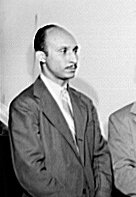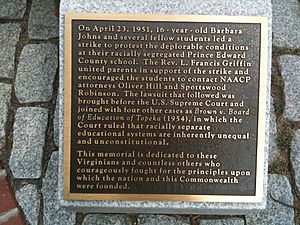Oliver Hill (attorney) facts for kids
Quick facts for kids
Oliver White Hill, Sr.
|
|
|---|---|

Oliver Hill oversees the swearing in of his former partner, Martin A. Martin as the first African-American member of the Department of Justice's Trial Bureau
|
|
| Born | May 1, 1907 Richmond, Virginia, United States
|
| Died | August 5, 2007 (aged 100) Richmond, Virginia, US
|
| Education | Howard University (BA, LLB) |
| Occupation | Civil rights attorney |
Oliver White Hill, Sr. (May 1, 1907 – August 5, 2007) was an American civil rights attorney from Richmond, Virginia. He worked to end racial discrimination and the idea of "separate but equal" laws.
Oliver Hill helped win important legal cases. These cases brought fairness in pay for black teachers and equal access to school buses. He also fought for voting rights, fair jury selection, and job protection. He worked as a lawyer for almost 60 years, retiring in 1998. In 1999, U.S. President Bill Clinton gave him the Presidential Medal of Freedom. This is one of the highest awards a civilian can receive.
Contents
Oliver Hill's Early Life and School
Oliver White was born in Richmond, Virginia, on May 1, 1907. His father left when Oliver was very young. His mother, Olivia, worked at resorts and traveled a lot. So, Oliver was mostly raised by his grandmother and grandaunt in Richmond.
When Oliver was six, his mother married Joseph Cartwright Hill. Oliver liked Joseph very much and later took his last name. The family moved to Roanoke. Oliver went to segregated schools there until the eighth grade. He also had his first jobs, like delivering newspapers and ice.
In 1923, Oliver moved to Washington, D.C. to attend Dunbar High School. This school offered a great education for black students at the time. Oliver played sports like baseball, football, and basketball.
His uncle, Samuel Hill, was a lawyer. When Samuel died, his law books were given to Oliver. This made Oliver interested in law. He learned that many rights were being taken away from African Americans. He decided to go to law school to fight against the unfair Plessy v. Ferguson decision. This decision allowed "separate but equal" laws.
Oliver worked part-time jobs during college and law school at Howard University. He often spent summers working at resorts to earn money for his education.
He studied law with Charles Hamilton Houston, who taught them how to challenge Jim Crow laws. Oliver was classmates and friends with Thurgood Marshall, who later became a Supreme Court Justice. In 1933, Thurgood Marshall graduated first in their law class, and Oliver Hill graduated second.
In 1934, Oliver married Beresenia Ann Walker. She was a school teacher. Their son, Oliver White Hill Jr., was born in 1949.
Oliver Hill's Legal Career
Starting as a Lawyer
Oliver Hill began practicing law in Roanoke during the Great Depression. He shared an office with other professionals. In 1935, he helped start the Virginia State Conference of NAACP branches. The NAACP is a group that fights for civil rights.
His law practice moved to Washington D.C. for a short time. In 1939, he returned to Richmond, Virginia. He later formed a law firm with Martin A. Martin and Spottswood W. Robinson III.
In 1940, Oliver Hill won his first big civil rights case. Working with Thurgood Marshall and others, he won Alston v. School Board of Norfolk, Va.. This case made sure black teachers received equal pay. His firm also worked to make school buildings equal and get bus transportation for black students.
In 1942, Hill filed a lawsuit in Sussex County, Virginia. He wanted black students to have access to high schools, just like white students. The county then provided buses for black students to attend a training school.
Serving in World War II
In 1943, Oliver Hill was drafted into the United States Army during World War II. He experienced racial discrimination during his service. He served as a Staff Sergeant in a unit of black engineers in Europe. He was discharged after the war.
Working in Politics
After the war, Hill returned to his law practice in Richmond. He also became the head of the Virginia NAACP's legal team. In 1949, he made history by becoming the first African American on the City Council of Richmond since the Reconstruction era. He hoped his election would help reduce prejudice in the city. However, he did not win re-election in 1951.
Fighting for Civil Rights
As the head of the Virginia NAACP's legal team, Hill and his partners filed many lawsuits. They helped get over $50 million in improvements for black students and teachers. Hill believed that schools were key to ending segregation.
In 1951, his team took on the case of students at R.R. Moton High School in Farmville, Virginia. These students had walked out of their old, rundown school. This lawsuit, Davis v. County School Board of Prince Edward County, became one of the five cases heard by the Supreme Court of the United States in 1954 under Brown v. Board of Education. This landmark decision declared school segregation unconstitutional.
During the 1940s and 1950s, Oliver Hill and his family faced threats because of his work. They received threatening phone calls, and a cross was even burned on their lawn in 1955.
Despite the dangers, Hill continued his fight. After the Brown decision, Virginia adopted a policy called "massive resistance" to avoid desegregation. This policy allowed the governor to close schools that tried to integrate. In 1959, the Virginia Supreme Court and a federal court ruled that most of these laws were unconstitutional. Schools in Norfolk and Arlington integrated peacefully soon after. However, schools in Prince Edward County remained closed until 1964.
After "Massive Resistance" ended, Hill worked for the Federal Housing Administration for five years. He helped desegregate public housing across the country.
He returned to his private law practice in Virginia in 1965. This was after the Civil Rights Act of 1964 and the Voting Rights Act of 1965 were passed. These laws, along with new regulations, helped integrate Virginia's public schools. His law partner, Samuel W. Tucker, argued the important case Green v. School Board of New Kent County in 1968. This ruling helped end "freedom of choice" plans that kept schools segregated.
Oliver Hill continued to work on civil rights cases until he retired in 1998.
Oliver Hill's Death and Legacy
Oliver Hill lived a long life, passing away peacefully at his home in Richmond on August 5, 2007, at the age of 100.
Virginia Governor Tim Kaine ordered flags to be flown at half-mast to honor him. He said that Hill's dedication to serving his state and country never failed. Over 1200 people came to view his body before his funeral. He is survived by his son, Oliver Hill Jr. Oliver Hill is buried in Richmond's Forest Lawn cemetery. His important papers are kept at Virginia State University.
Awards and Honors
Oliver Hill received many awards for his work:
- In 1959, the National Bar Association named him Lawyer of the Year.
- In 1980, the NAACP gave him the William Robert Ming Advocacy Award.
- In 1986, the NAACP Legal Defense and Educational Fund gave him the Simple Justice Award.
- In 1993, the American Bar Association gave him the Justice Thurgood Marshall Award.
- In 1996, the Oliver Hill Courts Building in Richmond was named after him.
- In 1999, President Bill Clinton awarded him the Presidential Medal of Freedom.
- In 2000, he received the American Bar Association Medal.
- Since 2002, the Virginia State Bar has given an award in his name to law students who help the community.
- In 2003, a bronze statue of Hill was placed outside the Greater Richmond Convention Center.
- In 2005, Hill received the Spingarn Medal, the NAACP's highest honor.
- Also in 2005, the Oliver W. Hill Building in Virginia's Capitol Square was named after him. It was the first state building in Capitol Square named for an African American.
Honors After His Death
- In 2008, the Virginia Civil Rights Memorial was dedicated in Capitol Square. It honors Oliver Hill and others who fought for civil rights.
- In 2009, several plaques were placed to honor Oliver Hill. One marks his former law office in Richmond. Others recall his legal victories in Norfolk and Prince Edward County. A marker in Roanoke honors his early life there.
- A street in Richmond, "Oliver Hill Way," is named after him.
- On May 1, 2019, the courthouse in Roanoke, Virginia, was renamed in his honor. His childhood home in Roanoke now hosts the Oliver Hill Mentoring Program.
See also
 In Spanish: Oliver Hill para niños
In Spanish: Oliver Hill para niños


